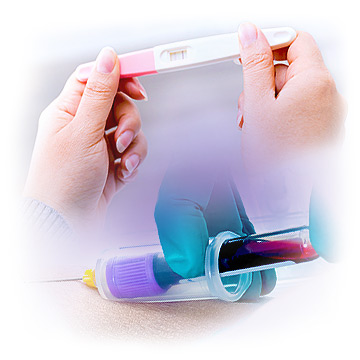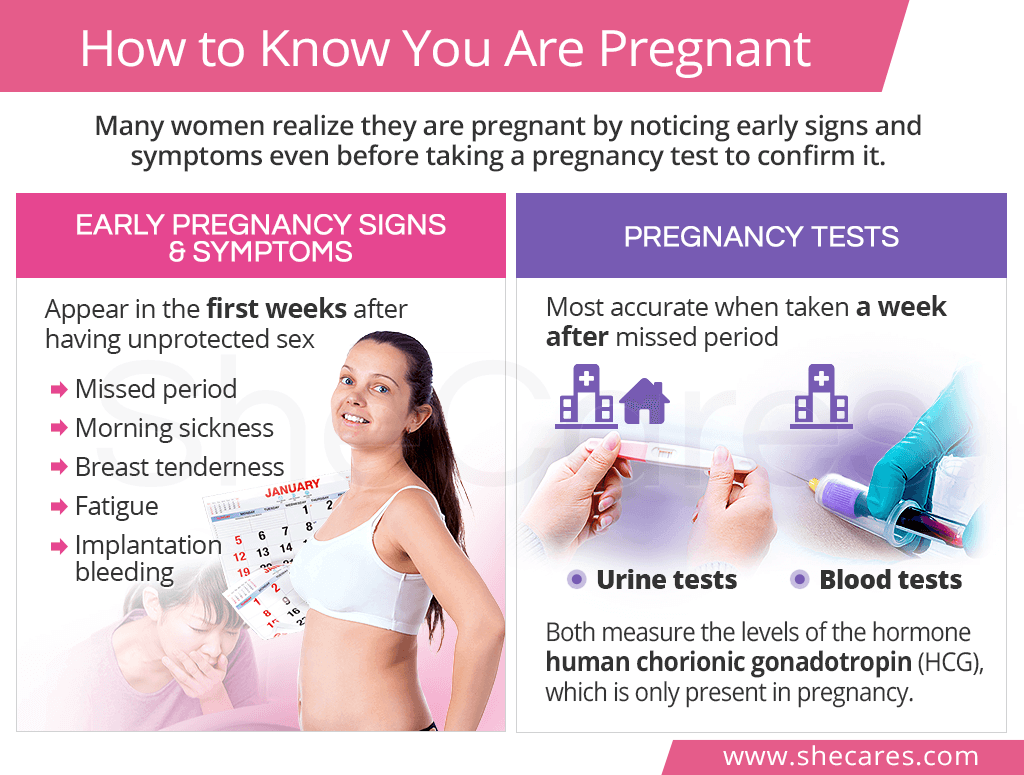Early Signs & Symptoms of Pregnancy

For many women, the key to how to tell they are pregnant lies in noticing their bodily changes. They might experience initial discomforts in the first weeks after having unprotected sex, way before taking a pregnancy test to confirm it.
Most Common Early Signs and Symptoms of Pregnancy
All signs and symptoms of early pregnancy are brought about by rapid hormonal changes of estrogen and progesterone that take place to support the implantation of the embryo and subsequent fetal development.
Early Pregnancy Symptoms
- Missed period. It is usually one of the first signs and symptoms of pregnancy with about 30% reporting it in the initial weeks since conception.
- Morning sickness. One of the most famous signs and symptoms of early pregnancy, nausea with or without vomiting can occur at any time of the day and often begins around the second and eighth week after conception.
- Breast tenderness. Painful or swollen breasts are very common and tend to appear relatively early on, about one to two weeks after conception.
- Fatigue. Feeling tired is another one of the frequently reported signs and symptoms that can be taken into account in the process of pregnancy confirmation.
- Implantation bleeding. Usually occurring between six to 12 days after conception, many actually overlook light spotting without associating it with an early sign and symptom of pregnancy.
Early Pregnancy Signs
The only objective sign of early pregnancy is the level of a hormone called human chorionic gonadotropin (hCG), which is produced by the placenta after implantation and confirms conception has indeed occurred.
Pregnancy is confirmed when blood hCG levels are above 25 mIU/mL
hCG levels between 6-24 mIU/mL are not sufficient for pregnancy confirmation and require re-testing
Although an ultrasound is not typically performed until after hCG has been detected and reached 2,000 mIU/mL, the presence of a gestational sac in the uterus after the fifth of sixth week of gestation can also serve as an early pregnancy sign.
Other Early Signs and Symptoms of Pregnancy
Additional early discomforts might overlap with signs and symptoms of pregnancy that develop later on as embryo growth progresses. They include the following:
- Increased flatulence
- Headaches
- Mood changes
- Frequent urination
- Sensitivity to smell
- Food cravings or aversions
Pregnancy Tests & Results

Although the aforementioned signs and symptoms of early pregnancy, especially a missed period, are sufficient for women to realize they are pregnant, the only unbeatable pregnancy confirmation is obtained by taking a pregnancy test.
Types of Pregnancy Tests
Of the two types of pregnancy tests available, both work by detecting the presence of hCG.
Urine Pregnancy Test. Pregnancy tests that detect hCG in urine are usually inexpensive and widely available at local pharmacies and grocery stores. When seeking pregnancy confirmation at a medical clinic, the same urine pregnancy tests will most commonly be used.
Blood Pregnancy Test. Blood pregnancy tests come in two types: qualitative or quantitative hCG blood test. The first only confirms the presence of hCG, while the latter measures its exact amounts in the blood.
When to Take a Pregnancy Test
Because it takes a while for hCG to be detectable in urine or blood, it is best to take a pregnancy test seven to ten days after a missed period.Although taking it sooner might already give accurate results, it is better to wait for at least seven days so that pregnancy confirmation results are reliable.
Pregnancy Test Results
Did You Know?
The baby's gestational age is not counted from ovulation, but the first day of your last period.
Use our due date calculator to estimate your baby's age!
While the results of blood pregnancy tests are given by a medical professional who can foresee possible errors, interpreting urine pregnancy tests taken at home can sometimes cause a great deal of confusion.
Positive pregnancy test. A positive result on a urine pregnancy test stick is usually marked by two vertical lines, which means that hCG is present in the urine, and a woman is pregnant.
Negative pregnancy test. A negative result is interpreted when only one vertical line appears on the pregnancy stick. The lack of the second line means that hCG is not present; therefore, a woman is not pregnant.
False positive pregnancy test. It happens when there are two horizontal lines, while a woman is not actually pregnant. It could indicate an ectopic pregnancy, an early miscarriage, or effects of certain medications.
Faint positive pregnancy test. A faded second vertical line is most probably a pregnancy confirmation,although it could also mean an error. As such, it is best to repeat the pregnancy test.
Key Takeaways
How do you know you are pregnant is a common of women of reproductive age, regardless of whether they have been actively trying to get pregnant or have not included pregnancy in their nearby future plans. The most frequent first realization that conception might have taken place is when a woman misses a period,although some get savaged by sudden bouts morning sickness, fatigue, and other early pregnancy signs and symptoms. However, the most accurate method of pregnancy confirmation is taking a urine or blood test, which measures the levels of hCG. A good understanding of how to confirm pregnancy and correctly interpret the results at home is important in order to get started with adequate prenatal care and give the baby a healthy start in life.
Sources
- American Pregnancy Association. (2019). Pregnancy Symptoms - Early Signs of Pregnancy. Retrieved April 29, 2019 from https://americanpregnancy.org/getting-pregnant/early-pregnancy-symptoms/
- American Pregnancy Association. (2018). Understanding Pregnancy Tests: Urine & Blood. Retrieved April 29, 2019 from https://americanpregnancy.org/getting-pregnant/understanding-pregnancy-tests/
- Eunice Kennedy Shriver National Institute. (2017). What are some common signs of pregnancy? Retrieved April 29, 2019 from https://www.nichd.nih.gov/health/topics/pregnancy/conditioninfo/signs
- Mayo Clinic. (2019). Do you know the early symptoms of pregnancy?Retrieved April 29, 2019 from https://www.mayoclinic.org/healthy-lifestyle/getting-pregnant/in-depth/symptoms-of-pregnancy/art-20043853?p=1
- Medline Plus. (2019). Pregnancy. Retrieved April 29, 2019 from https://medlineplus.gov/pregnancy.html#cat_95
- National Health System. (n.d.). Pregnancy test. Retrieved April 29, 2019 from https://www.plannedparenthood.org/learn/pregnancy/pregnancy-tests
- Planned Parenthood. (n.d.). When to Take a Pregnancy Test. Retrieved April 29, 2019 from https://www.plannedparenthood.org/learn/pregnancy/pregnancy-tests
